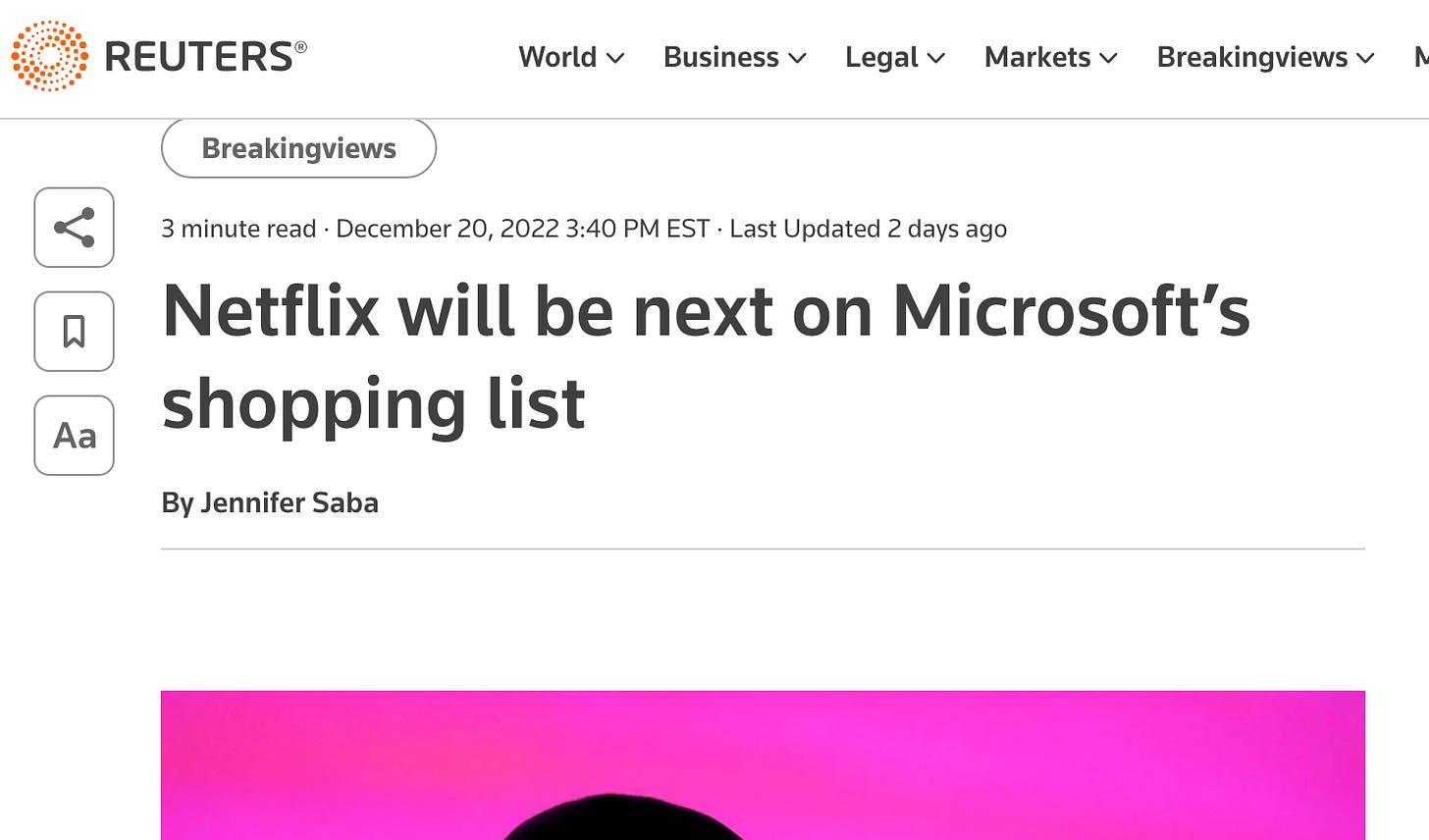Why Do Analysts and CEOs Keep Calling for Consolidation?
Why does Wall Street still think that everything will consolidate? Probably because for the last forty years, it always has. Is that dynamic finally changing?
Welcome to BIG, a newsletter on the politics of monopoly power. If you’d like to sign up to receive issues over email, you can do so here
Over the last four decades, the American economy has been in a fairly insane merger wave, such that we no longer have enough public companies to make up the Wilshire 5000 stock index. This wave crested last year, as the Fed’s easy money policies facilitated a record year in 2021, and then another record year in 2022. But this era is coming to a close, both because interest rates are up, and because the policy framework is changing. Increasingly, antitrust enforcers are saying that consolidation is unlawful.
Still, it’s not clear if the merger wave is slowing temporarily, or if the new antitrust framework heralds a regime change in how we do business. If it’s the latter, then corporate managers are going to have to learn a new set of business strategies, since the old model of deal-making won’t work. They will have to try things like investing in production or sales. But they don’t believe that, at least not yet. So far, the conventional wisdom in corporate America and Wall Street is that we’re in a momentary hiccup before another around of consolidation.
For instance, in April, senior correspondent at Recode Peter Kafka noted on The Ankler podcast that every major studio executive is betting on further consolidation of the industry. “The thesis for all of them,” is that there is going to be consolidation, ‘one day we’re going to stop competing with eight different studios for a project, we’ll be competing with three and we’ll be able to spend more rationally.’ They all believe that to be the case.”
Paramount CEO Bob Bakish made that clear earlier this month, saying that “Consolidation has been the rule in business for a long time, certainly been the rule in media. So, it’s hard for me to bet on anything other than consolidation will happen in the future.” Basically, unlike the old Hollywood execs who green-lit good movies as a business strategy, monopolization is what he knows. (To be fair to Bakish, monopolization is more reliable than trying to make good films.)
Then there’s software. Morgan Stanley’s Brittany Skoda argues that “2023 is going be an incredibly active year for M&A. We’re calling this The Great Consolidation driven by a challenging and volatile macro backdrop, the proliferation of public and private companies ripe for consolidation, the emergence of private equity and activists in agitating for M&A, and the need for growth and total addressable market expansion by mid- to large-cap strategics.” The Great Consolidation.
In Supermarket News, industry pundits believe that the Kroger-Albertsons deal heralds a “new grocery landscape.” “We’ve been thinking that we’d see more consolidation in the food retail space for some time now,” said CFRA Research analyst Arun Sundaram. If that deal goes through, other chains might merge, such as Ahold Delhaize USA (East Coast), Publix (Southeast), H-E-B (Texas), Hy-Vee (Midwest) and Wakefern/ShopRite (Northeast, Mid-Atlantic), Wegmans (Northeast, Mid-Atlantic), Giant Eagle (Rust Belt, Mid-Atlantic), Southeastern Grocers (Southeast) WinCo Foods (West), Price Chopper/Market 32 and Tops Friendly Markets (forming Northeast Grocery Inc.) and Raley’s and Bashas’ (forming The Raley’s Cos.).
Then there’s defense, where rocket engine maker Aerojet won’t stop trying to sell itself. Despite being blocked by the FTC from merging with Lockheed, it is giving it another go with a different partner, private equity-like defense shop L3. Former deputy undersecretary of defense for industrial affairs Jeff Bialos, who represents the firm, argued that the merger “will have a considerably easier time than the Lockheed-Aerojet deal.” I don’t know. The Pentagon has been complaining about consolidation for years now. But Aerojet executives seem to want to get out of the business of making stuff, and hand that problem over to someone else.
Pretty much every sector in finance, from asset management to banking, is seeking to centralize. In Becker’s Hospital Review, you can read about how “Hospital consolidation continues: 12 M&As that grabbed headlines in 2022.” And finally, let’s go back to Hollywood, where media mogul John Malone, predicts more consolidation among studios and streamers. “The smaller guys can’t get to scale,” he said. “They’ll inevitably have to combine in order to try and become profitable.”
Former Time Warner CEO Jason Kilar, writing in the Wall Street is even more explicit on the end game of monopoly. Kilar expects “two or three major mergers and/or acquisitions involving entertainment companies in the coming 24 months… the streaming cash flows of the leading companies will eventually be north of $10 billion a year, far greater than what most entertainment companies have each historically generated. For a precious few, the considerable investment will be well worth it.”
The only path these guys can conceptualize is to play financial games to create monopolies. Why? I suspect the reason is that most of them have no idea how to think about doing business in any other way except to engage in paper pushing of various corporate assets. And yet, in these news stories, blocked mergers such as Penguin-Simon & Schuster, as well as the FTC challenges of Microsoft-Activision, are beginning to creep into this narrative. But we haven’t won enough to change the conventional wisdom.
Still, the goal of the anti-monopoly framework is to stop this destructive monopolizing dynamic, and help business leaders recognize that their job is to invest and build, not consolidate. In the meantime, the millions of people involved in finance and corporate strategy will continue to think that mergers are natural and inevitable, until enough of them wind up in a courtroom with a judge telling them otherwise.




Consolidation is the natural extension of late stage hyper-capitalism, where only shareholder value is maximised, i.e profits, by minimizing actual work done and maximising economic rent seeking. One can only gain the power to increase prices, and seek higher economic rents, if one becomes a monopoly or has monopoly power.
It should be clear to everyone by now. Wall Street, loves nothing more than a monopoly. There are no competitive constraints to reduce prices, increase worker wages and cause market disruption. Just consistent, and controllable gains to shareholders as long as the industry grows.
It's not even capitalism, as we know capital markets encourage competition, cause prices to go down and force firms to remain competitive. It's a perverse alternative and is a clear admittance by companies that they have no merit to provide the market, no meaningful product, service, innovation or efficiency.
Want to create a new product as your main product has stopped growing? Buy a leading company in a tangential market, vertical integration. Want to increase marketshare of your main product? Buy your competitor, horizontal merger.
Anti-trust is really at the heart of nearly all socioeconomic problems in America, and is the only cure to the cancer that is this perverse capitalism and yet anti-trust has been completely gutted for the last 20, maybe even 40 years, intentionally so by Wall Street and hyper capitalists.
The window of opportunity is closing, let this perverse capitalism fester for a few more decades and you will have irreversible monopolies/oligopolies in nearly every distinct market. It cannot be reiterated how the world has dodged a bullet by having Biden elected and spear front anti-trust by electing Lina Khan and John Kanter.
We're at a time where the youth are more anti-capitalism than perhaps ever before. If the FTC/DOJ can harness this and gain wide populous support, it could be the catalyst for generations to come.
Beyond thinking that consolidation is natural and inevitable, it seems like the vibe is like there's a fundamental property right to engage in M&A.